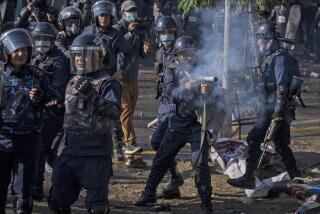Lawmakers abolish Nepal’s monarchy, declare a republic
- Share via
NEW DELHI — Nepal became the world’s newest republic when a freshly elected assembly voted Wednesday to abolish the Himalayan nation’s 239-year-old Hindu monarchy.
King Gyanendra, the last of the Shah dynasty, is to become an ordinary citizen and was given 15 days to vacate the salmon-colored Narayanhiti Palace in Katmandu, where he has been holed up, virtually incommunicado.
Thousands of jubilant Nepalese thronged the streets in anticipation of the vote taken in the assembly’s maiden session late Wednesday.
The vote itself, an overwhelming 560 to 4, was a foregone conclusion. Gyanendra’s powers have been steadily curtailed since a disastrous period of absolute rule ended in April 2006 amid a popular revolt. The major parties had all agreed that jettisoning the monarchy would be the new body’s first order of business.
“We have entered a new era today,” Prime Minister Girija Prasad Koirala declared, the Associated Press reported.
It did not happen without protest, however. A series of minor bomb blasts blamed on royalists have struck Katmandu, the capital, over the last few days. No one was killed.
Getting rid of the throne, and the deeply reviled man who sat on it, was the most cherished goal of the Maoist rebels who waged a bloody 10-year civil war in which more than 13,000 people were killed.
The rebels agreed to lay down their arms in November 2006 and join the political system. Their commanding victory in April elections stunned many fellow Nepalese, as well as international observers.
The Maoists have yet to form a government. About 20,000 of their fighters remain in United Nations-run camps.
The group’s leader, who goes by the nom de guerre Prachanda, is likely to become president or prime minister.
A wealthy businessman before ascending to the throne in 2001, Gyanendra was never expected to become king. But his reigning brother died in a shocking palace massacre allegedly committed by the crown prince, who then turned the gun on himself.
Gyanendra declared absolute rule in 2005, saying it was necessary to suppress the Maoist insurgency. But after the restoration of democratic government, his face was removed from the currency, statues of him were taken down and he hardly appeared in public again.
--
Special correspondent Bikas Rauniar in Katmandu contributed to this report.
More to Read
Sign up for Essential California
The most important California stories and recommendations in your inbox every morning.
You may occasionally receive promotional content from the Los Angeles Times.











